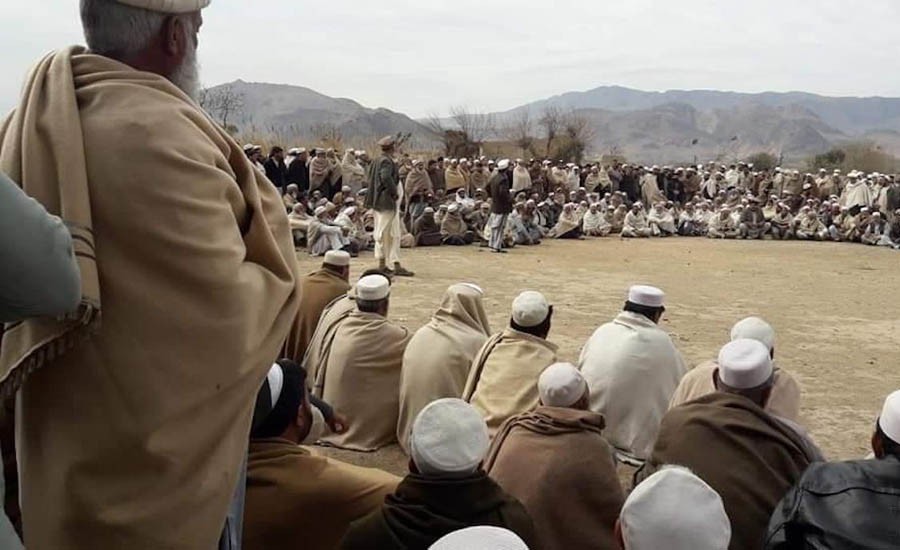
Politically aware citizens from tribal districts have strong reservations regarding the presence of Taliban and their potential revival in the tribal districts

Mohsin Dawar and Ali Wazir are elected MNAs from North Waziristan IX (NA-48) and South Waziristan II (NA-50) respectively. The two elected representatives are behind bars. They were arrested following the Khar Qamar North Waziristan incident of May 26 in which 13 tribesmen were killed when security personnel opened fire on protesters. Dawar and Wazir were accused of initiating attack on a security check post in Khar Qamar.
As a result, since June 8, Section 144 has remained enforced in North Waziristan Tribal District. It will stay in force for 30 days. "It is imperative to impose complete ban on dharnas (sit-ins), protest rallies, public meetings and public gathering of five or more persons," the notification reads. Likewise, the neighboring South Waziristan Tribal District is also under a month-long Section 144 since May 27.
Similarly, Election Commission of Pakistan (ECP) has accepted a petition, which seeks the disqualification of the two MNAs. The petitioner has accused the duo of "betraying the mother nation." More, the ECP, on the request of Khyber Pakhtunkhwa government, has moved the date for provincial assembly election in the seven tribal districts from July 2 to 20th of the month. Are these isolated events?
Traditionally, Indian northwest served as the British security state. Here civil and political liberties were oppressed. Generally, civil liberties are kept in check whenever state security, as conceived by ruling elites, is at stake. The idea is that civil liberties, as enshrined by democracy, give freedom of action which miscreants exploit at will. As a result, public order, the greater good in a security state, is always preferable to public liberties. At the theoretical level, maintaining order is the state’s raison d’être, the most important reason for the existence of state. But in a security state, maintaining order is not designed to protect liberties; it is designed to oppress liberties.
During the 19th century, especially during and after First Anglo Afghan War of 1839, colonial Britain viewed Czarist Russia’s southward expansion through Central Asia with grave suspicion. To a lesser extent, revisionist Afghanistan also posed as a challenge to the British India following the ceding of former Afghan territories first under Treaty of Gandamak 1879 during Second Anglo Afghan War and later under Durand Line agreement of Nov 1893.
The exorbitant cost of physical occupation following the 1839 war forced Britain to employ two pronged strategy. First, Afghanistan was conceived as a buffer state between Czarist Russia and British India. This strategy divided British interests in India from Czarist Russian interests in Central Asia. Secondly, colonial administration employed tribal areas in the Indian northwest, today’s tribal districts, to serve as a safety valve in the case of any Afghan military adventure across Indian side of the Durand Line.
For 71 years, Islamabad administered tribal districts in the northwest of Khyber Pakhtunkhwa in almost similar fashion as did the colonial British with some cosmetic changes, however. The draconian law of Frontier Crimes Regulation (FCR) was kept intact as the law of the land in the tribal areas. Under the law, no tribesman could appeal in Pakistani regular courts against the verdicts issued by a judicial system which was subservient to the whims of civil bureaucracy. Worse, collective responsibility, and not individual accountability, before law applied through the tribal hinterland. While colonial British kept the frontier aloof from political developments that swept across British India, Pakistani administration used it as a strategic backyard.
Tribesmen’s invasion of Kashmir following partition in 1947, the use of tribal districts as a launching pad against Soviets in Afghanistan and the launch of Taliban in mid 1990s and their sustenance post 9/11, are all instances of tribal districts serving the strategic purposes of the post-colonial state of Pakistan. In 1996, tribesmen were given the right to adult franchise. Similarly, back in August 2011, Political Parties Act (PPA) 2002 was extended to former FATA.
Nevertheless, the only real change transpired when in May 2018 Parliament passed the 25th Constitutional Amendment Bill which merged the seven tribal areas and Frontier Regions with Khyber Pakhtunkhwa. No less significant, in May 2019, Parliament passed the 26 Constitutional Amendment Bill, which sanctioned 12 and 24 seats for tribal districts in National Assembly and Khyber Pakhtunkhwa provincial assembly, respectively.
Recent developments suggest that these gains are in danger of reversal. Policymakers have strong reservations with regards to lar-o-bar yao Afghan slogan. To them, the slogan smacks of a secessionist design abetted by the Afghan government. Post-independence, the Afghan government challenged the legitimacy of the Durand Line on various grounds. First, Durand Line agreement was between Afghanistan and British India and with the collapse of British colonial edifice, the agreement fell into disrepute. Secondly, the agreement was forced upon Afghanistan. Third, the line divides the same nation, Pashtun, into two separate states. Afghanistan lays claim to areas ceded under the border agreements of Gandamak and Durand Line.
Crackdown on the Pashtun rights movement will hardly pay off. Politically aware citizens from tribal districts have strong reservations regarding the presence of Taliban and their potential revival in the tribal districts.